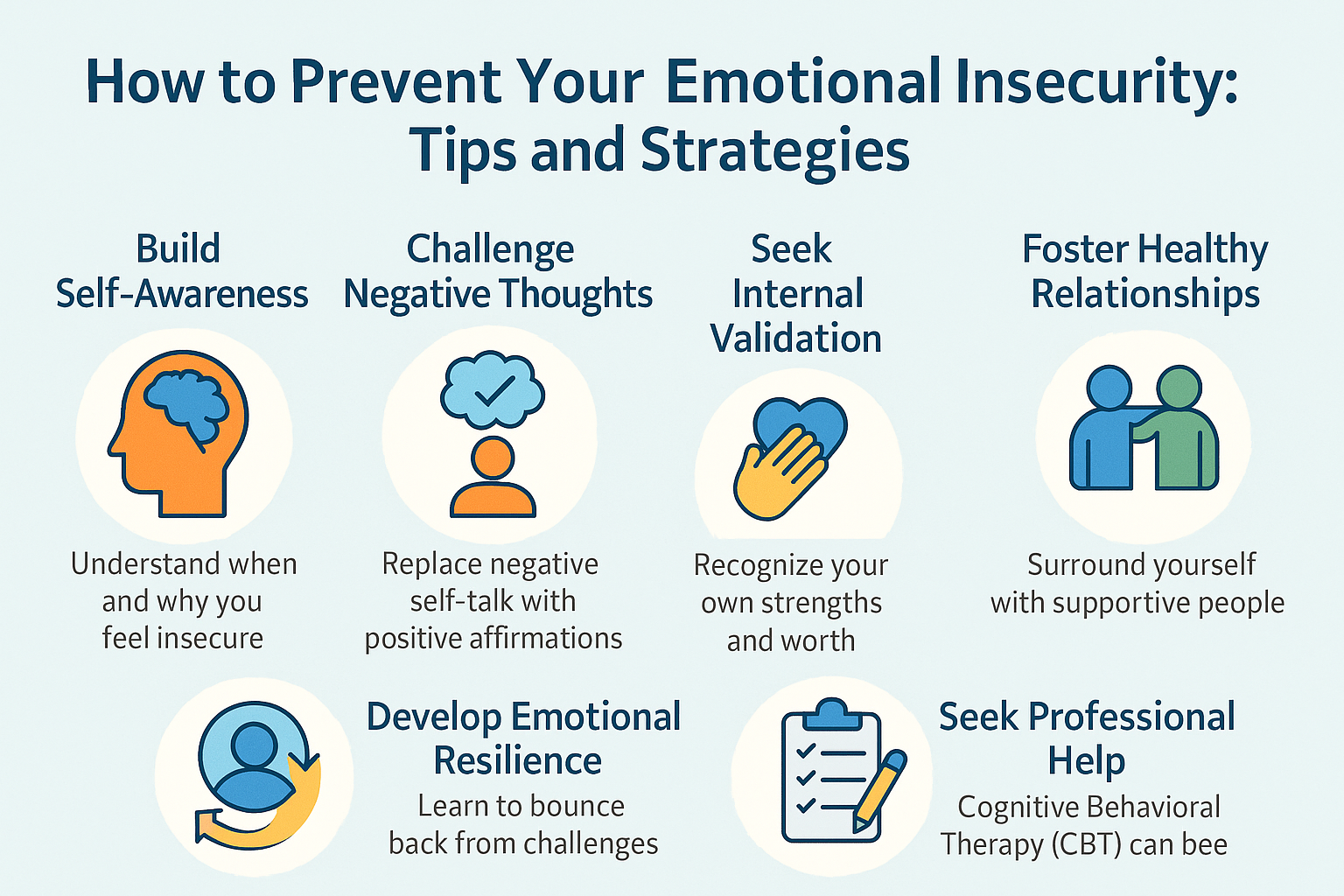

Emotional Insecurity: Tips and Strategies
Emotional insecurity can affect many aspects of our lives, from self-worth and relationships to how we perceive the world around us. Whether it’s rooted in past trauma, anxiety, or negative self-talk, emotional insecurity can leave us feeling vulnerable and unsure. The good news is that it is possible to prevent and manage these feelings by using effective strategies. Here are some actionable tips to help you build emotional resilience and feel more confident in yourself.
1. Build Self-Awareness
The first step in overcoming emotional insecurity is to build self-awareness. Understanding when and why you feel insecure allows you to address the root causes of your feelings. Insecurity might be triggered by certain events, such as a disagreement with a loved one or a negative comment at work, or it may stem from ongoing self-doubt. Journaling is an excellent way to track your emotions and identify patterns. By writing down your thoughts and feelings regularly, you’ll start to notice triggers that make you feel insecure, giving you the power to respond consciously, instead of reacting emotionally.
Tip: Practice mindfulness. Take a few minutes each day to focus on your breathing, observe your thoughts without judgment, and notice where insecurity arises. This practice can help you manage anxiety and stay grounded when faced with triggers.
2. Challenge Negative Thoughts
Insecurity often stems from negative self-talk—those internal voices that tell you you’re not good enough or that you’ll never succeed. These thoughts can spiral out of control if left unchecked. Cognitive Behavioral Therapy (CBT) focuses on identifying these distorted thoughts and replacing them with healthier, more realistic alternatives. When you catch yourself thinking negatively, pause and ask: “Is this thought based on facts, or is it just my emotions speaking?” Challenge the negative thought by looking for evidence that contradicts it. For example, if you think “I always fail,” remind yourself of past successes, no matter how small.
Tip: Use positive affirmations to reframe your thoughts. Instead of saying “I’m not capable,” try saying “I am competent and capable of handling challenges.” Repeating positive affirmations helps retrain your brain to focus on your strengths, not your flaws.
3. Seek Internal Validation, Not External Approval
When you constantly seek validation from others, emotional insecurity can take root. This is because relying on others for approval can leave you feeling unstable and dependent on their opinions. Instead, practice seeking validation from within. Recognize your own achievements and progress, no matter how minor they seem. For instance, if you set a small goal, such as organizing your workspace, celebrate it. Acknowledge your effort and recognize the value you bring to the world, without waiting for others to affirm it.
Tip: Start a gratitude journal. Every day, write down three things you appreciate about yourself—whether it’s a personal strength, a positive action, or a characteristic you value. This practice helps shift your focus from needing others’ approval to affirming your own worth.
4. Foster Healthy Relationships
The people you surround yourself with can greatly influence your emotional well-being. Negative or toxic relationships can reinforce feelings of insecurity, while supportive, uplifting connections can help you feel confident and validated. Building relationships with people who encourage you and listen to your concerns without judgment is essential. If you’re struggling with emotional insecurity, communicate openly with trusted friends or family members. Let them know what you’re going through and ask for support.
Tip: Be mindful of setting boundaries. It’s important to protect your mental health by limiting exposure to people or situations that make you feel insecure. Surround yourself with those who value and uplift you.
5. Develop Emotional Resilience
Emotional resilience is the ability to bounce back from adversity, stress, or negative emotions. It involves developing the tools to handle difficult emotions without letting them control you. One way to build resilience is by focusing on solutions instead of problems. When facing a challenging situation, instead of dwelling on how difficult it is, ask yourself, “What can I do right now to make this situation better?” This mindset shift helps you feel more empowered and less overwhelmed.
Tip: Incorporate self-care into your routine. Engage in activities that nourish your mind and body, such as exercising, taking a warm bath, or practicing meditation. Taking care of yourself physically helps you cope better with emotional stress and builds your resilience.
6. Seek Professional Help When Needed
If emotional insecurity is affecting your daily life or relationships, seeking professional help can provide a safe space to explore your feelings. Cognitive Behavioral Therapy (CBT) is an effective approach for addressing negative thought patterns and rebuilding self-confidence. A trained therapist can guide you through the process of identifying harmful beliefs and replacing them with more constructive ones.
Tip: If you’re new to therapy, consider starting with online CBT resources or finding a therapist who specializes in emotional insecurity. Many therapists now offer virtual sessions, making it easier than ever to get the support you need.
Introducing My Upcoming CBT Workbook: Available This September
I’m excited to announce that my CBT Workbook will be available this September through CMC Solutions (Coaching, Mentoring, and Consulting Solutions). This workbook will provide you with a step-by-step guide to using Cognitive Behavioral Therapy (CBT) techniques to overcome emotional insecurity, challenge negative thought patterns, and develop a more resilient mindset. Stay tuned for more details on how this resource can help you create lasting emotional well-being.
References:
-
Brown, B. (2012). Daring Greatly: How the Courage to Be Vulnerable Transforms the Way We Live, Love, Parent, and Lead. Penguin Random House.
-
Beck, A. T. (2011). Cognitive Behavior Therapy: Basics and Beyond (2nd ed.). The Guilford Press.
-
Neff, K. D. (2011). Self-Compassion: The Proven Power of Being Kind to Yourself. William Morrow.


